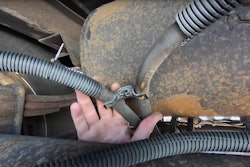The Federal Motor Carrier Safety Administration's CDL Drug and Alcohol Clearinghouse has been in effect a little over three years, and while it has taken thousands of potentially unsafe drivers off the highways, it has created some challenges for fleets.
Joining Jason and Matt on this week's 10-44, Shawn O’Neil, chief compliance and privacy officer at Vault Workforce Screening, talks about those challenges and ways fleets can address them.
Contents of this video
00:00 FMCSA’s Drug and Alcohol Clearinghouse
02:13 How fleets can help drivers avoid violations
07:01 Recent changes to FMCSA’s Drug and Alcohol Clearinghouse
08:51 When should fleets report actual knowledge to the Clearinghouse?
10:12 Hair testing and gray areas for reporting actual knowledge
11:34 Making sure fleets are compliant with drug testing
Jason Cannon
This week's 10-44 is brought to you by Chevron Delo 600 ADF ultra-low ash diesel engine oil. It's time to kick some ash.
Matt Cole
A recent changes to FMCSA's Drug and Alcohol Clearinghouse are affecting fleets.
Jason Cannon
You're watching CCJ's 10-44, a weekly webisode that brings you the latest trucking industry news and updates from the editors of CCJ. Don't forget to subscribe and hit the bell for notifications so you'll never miss an installment of 10-44.
Hey, everybody and welcome back. I'm Jason Cannon and my co-host on the other side is Matt Cole. FMCSA's Drug and Alcohol Clearinghouse has been in effect for a little over three years now, and while it's taken thousands of potentially unsafe drivers off the highway, it's created some challenges for fleets along the way.
Matt Cole
Prior to the Clearinghouse, it was relatively easy for a truck driver with a failed drug test to withhold that information and keep his or her job. Now those failed drug tests are reported to the Clearinghouse and fleets are made aware through required queries. Joining us this week on the 10 44 is Sean O'Neill, Chief Compliance and Privacy Officer at Vault Workforce Screening, who talks about the impacts of the Clearinghouse on the trucking industry since it took effect three years ago.
Shawn O'Neil
So the main impact it's had, and the important impact is, it's closed a loophole that always existed prior to 2020 where hiring employers and current employees really relied on the driver to disclose violations that might have occurred that the employer wasn't aware of. So if there was no disclosure, there was no awareness. There was a risk, then, to the motor carrier potentially. So that the Clearinghouses has closed that loophole by making it a requirement to query and to upload violations into it.
The other thing it has had an impact on the industry is it has removed a number of drivers from available capacity. I think as of December's data that was provided, there's 166,000 drivers that have had a violation reported and 120,000 still are in prohibited status. They're not able to return to safety-sensitive work.
Jason Cannon
Now, Sean just mentioned the staggering number of drivers that have had a violation reported to the clearing house and are still listed in prohibited status. Well, he mentions a few ways fleets can help drivers avoid violations that land them in the Clearinghouse to begin with.
Shawn O'Neil
I think the important thing for fleets to look at is education of employees. As you take a look at it, some of the things that we see as MRO provider, we're still surprised by the number of drivers that are surprised of impacts of things like CBD oil, that using a CBD product can result in a positive for THC even though the product they used has been labeled as THC free or at a low percentage rate. So it's still educating drivers and their managers at getting the word out that CBD oil can have a negative impact.
Same with the changes that have occurred with marijuana laws at the state level, both medicinal and recreational. We will hear driver state, "Well, I live in a state where it's available to me recreational." And that could be correct, but it's not legal on the federal level yet. It's still considered a schedule one. Having drivers fully aware of the impacts of THC can help. As you look at the Clearinghouse of the drugs reported in, 57% of it is marijuana. So that is the largest leading drug that is resulting in violations.
The other education piece that's important is talking about refusals to test, making sure that drivers understand when they go to a clinic, when it's okay for them to leave because the Clearinghouse has got over 25,000 refusals to test for the reported-in. And how many of those could have been avoided with some driver education? Because that is something we hear from our clients from time to time is drivers leaving the clinic too early and now they have a refusal, what are they supposed to do? So those are some simple things to educate on.
And then I think employers need to monitor their service agents, make sure that the clinics they are using understand the rules when it comes to refusals to task and that they are doing testing appropriately, making sure that the groups that are contracting with our... Have their best needs in front of them.
You asked about what can employers do for drivers that do have a violation, and I think it's really supporting them through that return-to-duty process. Employers do have to supply SAP information to the driver when they have a violation, but it's really looking at their drug testing policies and seeing what is their approach to drivers who have a violation. Do they retain them outside of safety sensitive work until they're through a return-to-duty test? There's 18,000 drivers right now who are eligible to return upon a negative return-to-duty. My guess is some of those drivers might be finding trouble having an employer hire them on to do that return-to-duty test because it can't just be done on their own. It has to be done through a motor carrier. So I think supporting drivers through that process is a way that employers can retain some of that skilled help that they currently have on staff who may have had an issue that they need a little support to get through.
Matt Cole
When the Clearinghouse turned three in January, some changes took effect that are helpful for fleets. In early March, FMCSA administrator Robin Hutcheson also announced another change to the Clearinghouse. We'll hear more on those after a word from 10-44 sponsor, Chevron lubricants.
Jason Cannon
Protecting your diesel engine and its aftertreatment system has traditionally been a double-edged sword. The same engine oil that is so essential to protecting your engine's internal parts is also responsible for 90% of the ash that is clogging up your DPF and upping your fuel and maintenance costs. Outdated industry thinking still sees a trade-off between engine and emission system protection and Chevron was tired of it, so they spent a decade of R&D developing a no-compromise formulation. Chevron lubricants developed a new ultra-low ash diesel engine oil that is specifically designed to combat DPF ash clogging. Delo 600 ADF with OMNIMAX technology cuts sulfate ash by a whopping 60%, which reduces the rate of DPF clogging and extends DPF service life by two and a half times. And just think what you can do with all the MPGs you're going to add from cutting your number of re-gens. But Delo 600 ADF isn't just about after treatment. It provides complete protection extending drain intervals by preventing oil breakdown. Before, you had to choose between protecting your engine or your after treatment system, and now you don't. 600 ADF from Delo with OMNIMAX technology, it's time to kick some ash.
Shawn O'Neil
The first change we've recently saw was back in January. The Clearinghouse finally turned three, so it's out of the terrible twos phase, it's now a three-year-old and that means it's got a full three years worth of data. So it actually reduces some of the work that motor carriers have to do through the hiring process. For the last three years, they've had to send a request to previous employers as well as query the Clearinghouse to get the drug and alcohol violation information. So they're actually now going to be able to streamline that hiring process and just query the Clearinghouse for it. They still have to reach out for previous employer information on accidents and just employment history in general, but it does kind of streamline that process. It also means that employers don't have to respond to the drug and alcohol requests because, again, that's being handled through the Clearinghouse. That takes some administration burden off of more the carriers, having the Clearinghouse do that for them.
The other big change came last week. Out of the blue, FMCSA sent an email to everyone stating that now they're changing some of the parameters of changes to query. Prior to last week, if you ran a pre-employment query and the driver's information changed within 30 days, it would send you a notice stating, "Hey, information has changed. Come out here and run another query." Now they've extended that window to 12 months and so that's really going to give carriers visibility to what might be happening within their fleet if drivers are applying to other carriers and having a violation. So it's closing another loophole within the process and giving carriers just that visibility to who might be in trouble when it comes to using substances or alcohol.
Jason Cannon
One of the biggest areas with the Clearinghouse that Sean has seen fleet struggle with is actual knowledge, and when fleet should report actual knowledge to the Clearinghouse.
Shawn O'Neil
Probably the one thing we hear the most about when it comes to Clearinghouse is with regard to actual knowledge violations and what is an actual knowledge violation. If you look in 382107, it is clearly defined what makes up an actual knowledge violation, but sometimes carriers have a situation where they're, "I know about this but it doesn't really meet the definition of actual knowledge," how to handle those situations. I think that's probably the one area we still see fleets struggle with is, "I've got information. Should I be reporting it into the Clearinghouse?" I think there could be some technology tweaks that would help carriers maybe have integrations.
The other thing we see is they will ask us, "Did the MRO report a positive violation into the Clearinghouse?" because they don't have visibility to that. Now possibly with this followup query, they may see that the record changed, so they could run that follow-on query, but depending on the timing of it, they may not see it. So I think that would be the other thing carriers could benefit from is making sure that their MRO did report the violation in.
Matt Cole
When it comes to actual knowledge reporting, there are a few gray areas on when a fleet can report it, including those who conduct hair testing.
Shawn O'Neil
Some of the things have come in where it's been reported in to the motor carrier through a police report but there's been no citation issued. If there's no citation, a moving traffic violation in a commercial vehicle with a citation, what are they supposed to do with it? Or if something comes in on the driver's medical exam, it's not necessarily an admission or what we see are the carriers who have hair testing. So there's a block of carriers that do hair testing alongside of their DOT urine testing and sometimes they'll have a positive on the hair but not on the DOT urine. So they have that knowledge that there's a positive hair test, but there's no room for that in the Clearinghouse because the Clearinghouse only holds DOT urine and that doesn't meet the definition of actual knowledge, even though they're holding an MRO result report that says this person has been positive for whatever drug is in the panel. The hair testing one seems to be one that gets a lot of attention because it's through an MRO process, right? What do you do with that, then?
Jason Cannon
Vault works with fleets to make sure they're staying compliant with drug testing requirements, and Sean offers some tips on what fleets should look for when looking for a company to partner with.
Shawn O'Neil
Fleets who are looking for a compliance partner, I would suggest looking at their expertise first and foremost. What is their depth of knowledge when it comes to not only drug and alcohol testing or employment screening, but what is their depth of knowledge with the transportation industry? Because what might apply in retail or manufacturing doesn't necessarily apply in transportation. So it's making sure to understand both sides of the industry and I would say test prospective vendors that they're looking at using. Test their knowledge, ask them some tough questions, see how they would respond to make sure that you are getting the best resources for what you're paying the company to do.
I think it's also looking at how they handle the work. Do they subcontract any of it out? Because is that introducing another third party into the mix that the motor carrier may not know about? So it's making sure how they manage their subcontractors, what configurations do they offer? One transportation company is not the same as another transportation company, so what configurations can they offer you? What integrations do they have? What applicant tracking systems do they integrate with to reduce that administrative task of entering information into another system? How can information just flow through so that compliance tasks aren't a burden, that they kind of are nice, easy stream from start to finish?
And then how do they service you? What is their service model? Do you have to call into a call center? Do you have to use a ticketing system, or are you getting a live person on the phone who can take your question then and there? What access do you have to the experts? Do you have to go through a phone tree or do you have to go through a call center to get to the medical review officer or can you just call the medical review officer direct and run your questions through them?
And so with a company like Vault, we've been in the industry for over 30 years. We lead with customer obsession, so we want to make sure that not only are we compliant, but we're doing it in a way that services our customers to make sure that they've got a partner through compliance and that we're there when things pose to be a challenge. It's not just being there after something has occurred, but it's being right there in the weeds, trying to solve things, making sure that they have someone standing next to them as they're working through some of their compliance needs.
Jason Cannon
That's it for this week's 10-44. You can read more on ccjdigital.com. While you're there, sign up for our newsletter and stay up to date on the latest in trucking industry news and trends. If you have any questions or feedback, please let us know in the comments below. Don't forget to subscribe and hit the bell for notifications so you can catch us again next week.










